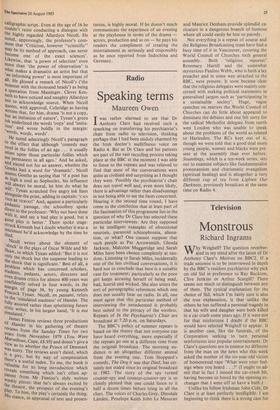Radio
Speaking terms
Maureen Owen T was rather alarmed to see that Dr 1 Anthony Clare had received such a spanking on transferring his psychiatrist's chair from radio to television, thinking perhaps that 1 had been unduly charmed by the Irish doctor's mellifluous voice on Radio 4. But as Dr Clare and his patients are part of the vast recycling process taking place at the BBC at the moment I was able to listen to the repeats and was relieved to find that most of the conversations were quite as civilised and surprising as I thought they were. Possibly the psychiatrist's chair does not travel well and, even more likely, there is advantage rather than disadvantage in not being able to see the faces concerned. Hearing it the second time round, I have come to the conclusion that at least part of the fascination of this programme lies in the question of why Dr Clare has selected these particular interviewees. Are they supposed to be intelligent examples of obsessional neurosis, paranoid schizophrenia, aliena- tion, or what? One cannot suppose that such people as Pat Arrowsmith, Glenda Jackson, Malcolm Muggeridge and Sarah Miles have been chosen completely at ran- dom. Listening to Sarah Miles, incidentally one of the less civilised conversations, it is hard not to conclude that here is a suitable case for treatment; particularly as the poor girl keeps accusing herself of being mad, bad, horrid and wicked. She also utters the sort of pornographic references which one does not usually hear on radio. In all, one must agree that this particular method of interviewing the unredeemed is Probably best suited to the privacy of the wireless. Repeats of In the Psychiatrist's Chair are broadcast at 7.20 p.m. on Saturdays.
The BBC's policy of summer repeats is based on the theory that not everyone can have heard everything, more especially if the repeats go out at a different time from the original broadcast. The morning au- dience is an altogether different animal from the evening one. Tom Stoppard's comedy, The Dog it was that Died, has cer- tainly not staled since its original broadcast in 1982. The story of the spy turned counter-spy and counter-counter-spy is so closely plotted that one could listen to it half a dozen times before tying in all the clues. The voices of Charles Grey, Dinsdale Landen, Penelope Keith John Le Mesurier
and Maurice Denham. provide splendid ca- ricature in a dangerous branch of humour where all could easily be lost to parody.
Not everything is a repeat of course and the Religious Broadcasting team have had a busy time of it in Vancouver, covering the World Council of Churches sixth general assembly. Both 'religious reporter' Rosemary Hartill and the somewhat mysterious Pauline Webb, who is both a lay preacher and in some way attached to the BBC, were present. It soon became clear that the religious delegates were mainly con- cerned with making political statements in generalised jargon such as 'participating in a sustainable society'. Huge, vague speeches on matters the ,World Council of Churches can do little about appeared to dominate the debates and one felt sorry for the radical Methodist delegate from north west London who was unable to speak about the problems of the world as related to Harlesden. The RCs kept out of it, though we were told that a good deal more young people, women and blacks were pre- sent at the assembly than ever before. Soundings, which is a ten-week series, sets out to examine subjects like fundamentalist protestantism and charismatic evangelism (spiritual healing) and is altogether a very different cup of tea from Lighten Our Darkness, previously broadcast at the same time on Radio 4.


































 Previous page
Previous page